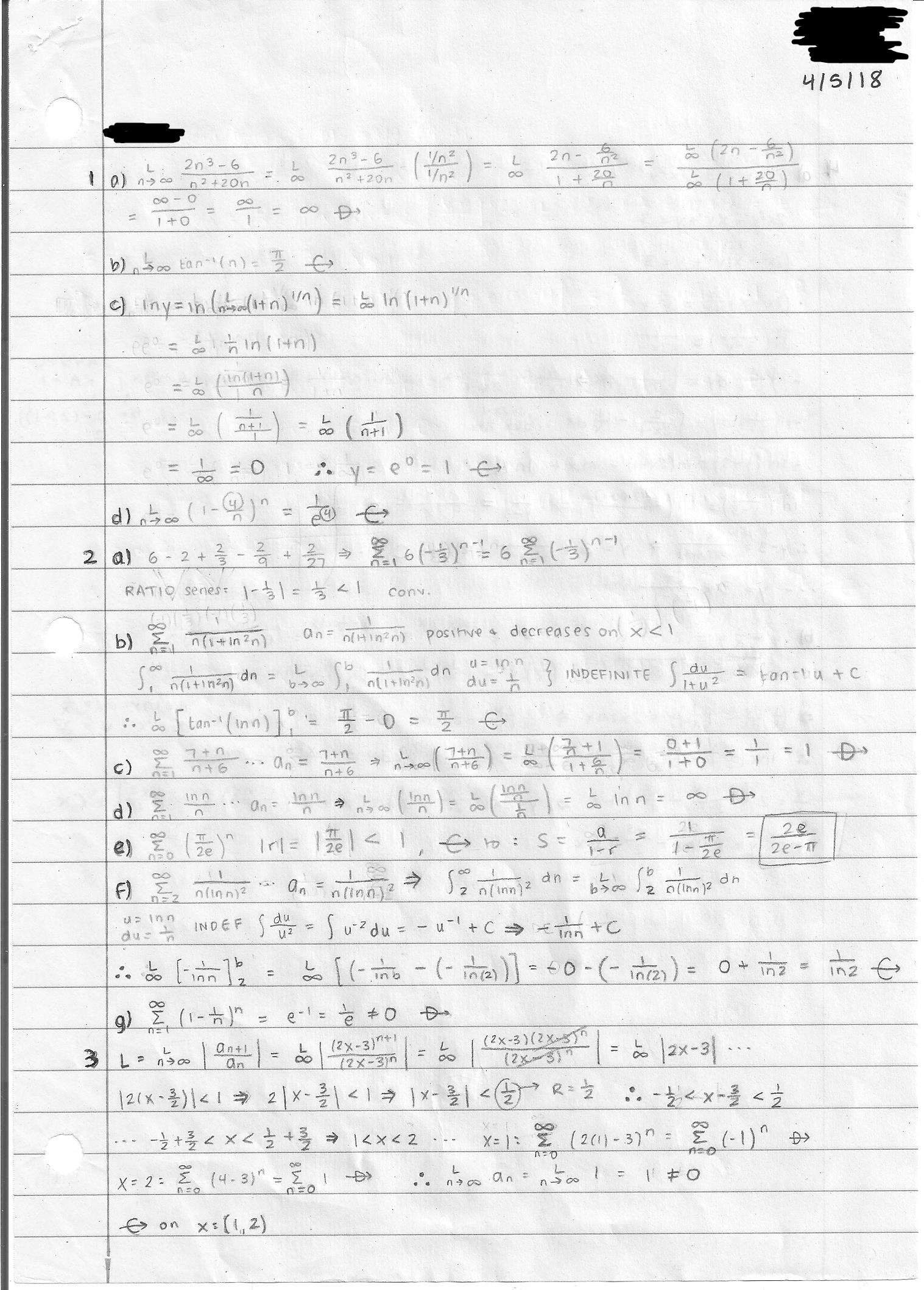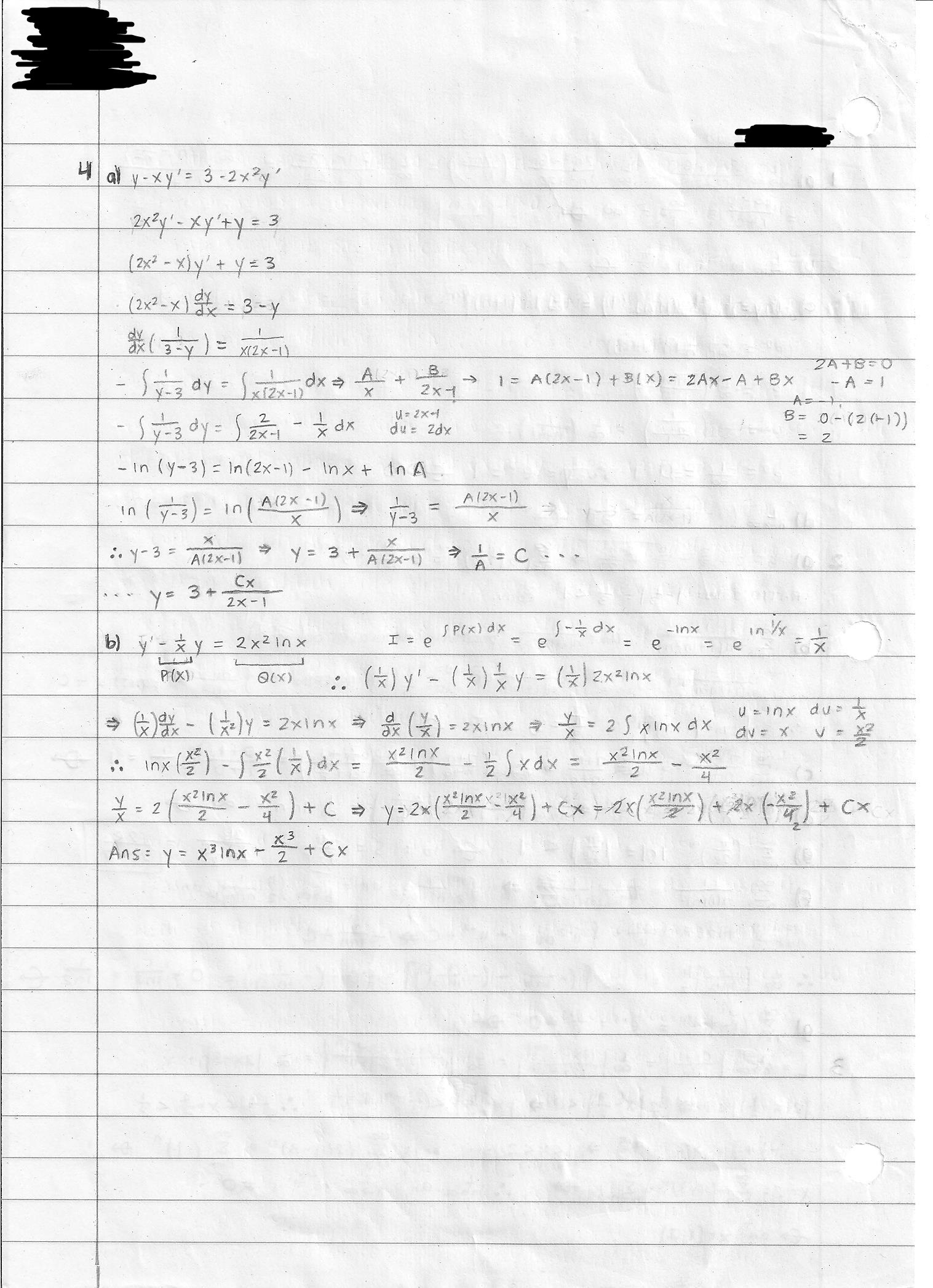Series and sequences?
This is for self-reference ( I will be answering it ).
Feel free to edit if you want to correct anything, though.
-
Determine if the following sequences are convergent or divergent.
a) #a_n=(2n^3-6)/(n^2+20n)#
b) #a_n=\tan^-1(n)#
c) #a_n=(1+n)^(1/n)#
d) #a_n=(1-4/n)^n#
-
Determine if the following series are convergent or divergent. Use the appropriate test and check all the conditions.
a) #6-2+2/3-2/9+2/27-2/81+...#
b) #\sum_(n=1)^\infty1/(n(1+\ln^2n))#
c) #\sum_(n=1)^\infty(7+n)/(n+6)#
d) #\sum_(n=1)^\infty\ln(n)/n#
e) #\sum_(n=0)^\infty(\pi/(2e))^n#
f) #\sum_(n=2)^\infty1/(n(\ln(n))^2#
g) #\sum_(n=1)^\infty(1-1/n)^n#
-
Find the values of #x# of which the following series is convergent.
#\sum_(n=0)^\infty(2x-3)^n#
-
Solve the following differential equations.
a) #y-xy'=3-2x^2y'#
b) #y'-1/xy=2x^2\ln(x)#
This is for self-reference ( I will be answering it ).
Feel free to edit if you want to correct anything, though.
-
Determine if the following sequences are convergent or divergent.
a)#a_n=(2n^3-6)/(n^2+20n)#
b)#a_n=\tan^-1(n)#
c)#a_n=(1+n)^(1/n)#
d)#a_n=(1-4/n)^n# -
Determine if the following series are convergent or divergent. Use the appropriate test and check all the conditions.
a)#6-2+2/3-2/9+2/27-2/81+...#
b)#\sum_(n=1)^\infty1/(n(1+\ln^2n))#
c)#\sum_(n=1)^\infty(7+n)/(n+6)#
d)#\sum_(n=1)^\infty\ln(n)/n#
e)#\sum_(n=0)^\infty(\pi/(2e))^n#
f)#\sum_(n=2)^\infty1/(n(\ln(n))^2#
g)#\sum_(n=1)^\infty(1-1/n)^n# -
Find the values of
#x# of which the following series is convergent.
#\sum_(n=0)^\infty(2x-3)^n# -
Solve the following differential equations.
a)#y-xy'=3-2x^2y'#
b)#y'-1/xy=2x^2\ln(x)#
1 Answer
-
a)
#\infty# , divergent
b)#\pi/2# , convergent
c)#1# , convergent#\color(red)(♦)#
d)#1/e^4# , convergent -
a)
#r\lt1# , convergent#\color(red)(♦)#
b)#\pi/2# , convergent
c)#1# , divergent
d)#\infty# , divergent
e) convergent to#(2e)/(2e-\pi)#
f)#1/\ln(2)# , convergent
g)#1/e\ne0# , divergent -
convergent on
#1\ltx\lt2# #\color(red)(♦)# -
a)
#y=3+x/(A(2x-1))# OR#y=3x+(Cx)/(2x-1)# #\color(red)(♦)#
b)#y=x^3\lnx-x^3/2+Cx# #\color(red)(♦)#
Explanation:
- For 1c, thanks to Steve M.
- For 2a, thanks to Parabola
- For 3, thanks to VNVDVI
- For 4a, thanks to Steve M.
- For 4b, thanks to Steve M.



